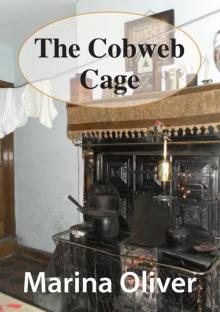- Home
- Marina Oliver
The Cobweb Cage Page 7
The Cobweb Cage Read online
Page 7
'They do say it's the hottest day ever recorded,' John glanced across at them.
'Even hotter slaving over cooking,' Mary agreed. 'Poppy, what are you doing in there?'
'Looking for my letter to Johnny, I hadn't finished it,' Poppy's voice was muffled. There was a brief silence, then she let out an enraged yell. 'Ivy! Where's that little devil? Mom, Pa, look, she scrawled all over my letter!' she was almost crying as she emerged from the front room, the sheet of paper held out before her.
Ivy cowered into her father's arms, but Poppy, angry as she was, knew better than to approach her little sister.
'Ivy, that was naughty!' Mary sighed.
'I didn't know what it was! I can't read yet!' Ivy whined plaintively.
'It was my only piece of nice paper, and it was important! Now I can't send it!' Poppy complained, almost in tears.
'I've got a postcard you can have,' Marigold said swiftly. 'It's in the drawer.'
'I want a letter, not a postcard anyone can read, even if it does only cost a halfpenny.'
'Ask next time you find some paper, don't just take it,' John ordered, and Ivy, chastened, nodded before scrambling off his lap and crossing to where Poppy stood in the doorway.
'I'm sorry, Poppy,' she whispered, her big eyes filling with tears. 'I won't do it again.'
Poppy bit back the retort that Ivy always forgot promises when it was convenient for her, and took the paper Marigold produced.
'What's so secret and important?' John asked. 'Your Mom's going to write to Johnny in a day or so, you can send it then.'
'But I wanted to send it today. It's not a secret really, I just wanted to ask Johnny if there were any jobs for me.'
They all looked at her in blank astonishment.
'A job? In Longbridge?' Mary demanded.
'What sort of job?' asked Marigold.
'You can't possibly leave home, you're far too young,' John said loudly, drowning the others.
'Why can't I? I'll be getting my leaving certificate soon, and Johnny's gone. He left home. There are lots of jobs in Longbridge or Birmingham I could do.'
'Be quiet, girl! You're not going!' John thundered.
'You're far too young, Poppy, you couldn't live in lodgings like Johnny does, so it would be impossible unless you went into service,' Mary said more quietly. 'And I don't like the thought of you going to someone we don't know, so far away. Besides – '
Poppy interrupted, one of her swift rages consuming her and making her blind to the fierce look in her father's eyes.
'Service! I'm not going into service, to be a skivvy! I'm going to work in a factory where I can earn more money, like Johnny does – '
'That's enough! I've told you to be quiet! You're not going. You're staying here when you leave school to help your Mom.'
Poppy swallowed, but persisted.
'But Marigold helps Mom. It doesn't need both of us, so why can't I – '
Mary sighed, and as John was about to speak again put out her hand to catch his.
'John, let me.'
He looked at her, then shrugged.
'Poppy, it was only arranged yesterday and there hasn't been a chance to tell you all yet. Mrs Nugent came last night to collect some sewing, and she's offered Marigold a job.'
'Me?' Marigold gasped. 'Offered me a job?'
'Yes, love. With her daughter. Pa and I've talked it over and decided you shall have the chance. You've been such a good lass all this time, never complaining.'
'But what about the house? Will you stop working for Mrs Andrews?'
'No, we can't afford that. The strike put us back just when things were looking better, though it's a lot easier now Johnny's making so much money and sending a lot home. He's a good lad.'
'I'd send a lot home too,' Polly put in, seeing a chance to retrieve the situation.
'I need you at home to take Marigold's place and look after Ivy.' 'But Mom! It's not fair! Why shouldn't I get a job? Marigold likes doing the house and things, and I wouldn't, I'd hate it!'
Mary shook her head. 'When Pa says you're too young he means you'll not be allowed to do a job, not full time. Apart from our not letting you go all that way you couldn't earn enough in a few hours to pay for lodgings. Now be quiet, it's all decided and that's that!'
After a few moments of stunned disappointment Poppy spoke in a small voice.
'How old do I have to be?'
'Fourteen before you can work full time. Two and a half more years.'
'Do you promise I can go out and get a job then?'
'If it's possible, love. I can't promise when I don't know what's going to happen, can I? But if it's possible you can.'
'That'll be 1915,' Poppy whispered, 'ages away,' and with a gulping sob she turned and rushed up the stairs.
'Mom,' Marigold said quietly, and Mary turned back to her, sighing.
'I'm sorry, love, to tell you like that.'
'What sort of job? Does Mrs Nugent's daughter want a kitchen maid, or a housemaid perhaps?'
'Better than that, Marigold. It seems her daughter's carrying another child. She's got two already, and wants a sensible girl to help the nanny, partly nursery maid, partly under-nanny, and sometimes parlourmaid when they have visitors. She thought of you, love, and I was so proud when she asked me.'
'Her daughter doesn't know me!'
'Mrs Nugent recommended you. She said what a sensible, polite girl you are.'
'But can you manage without me?'
'Would you like to go? You've worked so hard since you were a little one, and never had the chance to get out of the house, it would be such an opportunity for you. I remember Miss Alice, Mrs Roberts now. She's a real nice lady. Wouldn't that be something?'
'What do you say, pet?' John asked gently. 'It's in Oxford, Mrs Roberts' husband is a Professor at the University there. It's a long way off, but you could come home by train, sometimes. We could still see you.'
'Oxford! That's miles away, even further than Birmingham!' Marigold exclaimed, overwhelmed.
'You wouldn't be frightened, so far away, alone?' Mary asked quickly. She hadn't wanted to send her beloved daughter so far away, but it was a far superior job than she could hope for in Hednesford. The money would be useful, and Marigold would have more chances to better herself in a big city.
'No – o,' Marigold hesitated.
'We'd never make you go.'
'I'd be all right. But what about Poppy? She doesn't like doing the house, only cooking. Would Mrs Roberts take her?'
'Poppy's too young, as I said, and Mrs Nugent didn't offer her the job. Besides, it's time you had a chance to do something else. Now Mrs Nugent's coming tomorrow, so shall I say you'll go as soon as her daughter wants you?'
*
Marigold paused, propping a corner of the heavy tray on the newel post and easing her back. She'd never have believed how tiring it was carrying heavy metal trays up two flights of stairs.
'I thought I was used to lifting heavy buckets of water here at home,' she'd said on her first free weekend as she and Mary walked home from St. Peter's.
'It isn't too much for you, is it?' Mary asked anxiously.
Marigold laughed. 'No, Mom, of course not. It's just different. At least I don't have to carry up coal, Ethel does that, and all the housework, and though she's smaller than me she's as strong as a horse. I'm not used to all those stairs.'
There were ten at home, narrow and steep, and they only used the bedrooms for sleeping and when someone was ill. Even then they rarely had fires in the tiny grates so it wasn't a constant climb up and down, fetching and carrying, all day long.
At Gordon Villa there were sixteen steps in the first flight, then another ten to the half landing and four more to the top floor. But she was getting used to them, she told herself firmly. She didn't notice the ache in the back of her legs until quite a way through the day now. And after the inevitable first week or so of severe homesickness she had settled in. Everything apart from the stairs was unbelievab
le bliss.
'Fifteen pounds a year and one Saturday and Sunday a month free, Marigold,' Mrs Nugent explained when she told Marigold about the work she would be expected to do for Mrs Roberts. 'You'll be able to come home by train. And you can have Wednesday afternoons, too, from three o'clock, after the children have had their dinner. You will help Miss Baker with the children and be under her direction. Do you understand?'
'Yes, Mrs Nugent, Ma'am,' Marigold said, her voice hoarse with nervousness.
'I have some suitable dresses I can give you, and caps and aprons, so there is no need for you to make any, Mary,' Mrs Nugent said briskly. 'I'll send them to Oxford to be ready for Marigold.'
It was only when she'd seen these that Marigold appreciated what a strain it would have been if her mother had been obliged to buy the material for so many garments as well as underwear.
'Three of everything, you'll need,' Mary said briskly, 'and the best quality I can afford.'
'Mom, it's threepence three farthings a yard,' Marigold gasped.
They were in Mr Holland's draper's shop in Market Street, and Mary didn't reply. She was busy working out how many yards she would need for vests, camisoles, drawers, bust bodices and petticoats, as well as nightgowns.
'And six pairs of black cotton stockings. You can buy woollen ones with your first quarter's wages,' she added to Marigold as the assistant turned from the counter to reach for the box on a high shelf behind her.
They had so much to do Marigold didn't have time to think until she was on the train. It seemed an endless journey, for Marigold had never before been further than Lichfield. Pa had taken her to Birmingham on one train, and they'd walked across the city from New Street to Snow Hill Station where he'd seen her safely on the train for Oxford.
She had been too bemused to take in much of Birmingham, for the buildings were immense, the main streets so wide. But John made sure she'd know her way back for her free weekends.
At Oxford she was limp with relief when an elderly coachman appeared and said he'd come to meet her.
As they drove along the Woodstock Road Marigold gazed about her in awe. She'd never seen such big houses, so many close together. Gordon Villa was larger than most, set back in its own big garden, with stables and a coach house behind, and rooms above where Jim Dangerfield, the coachman, and his wife who was Mrs Roberts' cook, lived.
Inside the house Mrs Roberts welcomed her warmly. She was a small, slightly faded woman, pale faced and thin, but her smile was kind.
'I know you'll be a good worker, Marigold, if my mother says so. I hope you'll be happy with us.'
Marigold was shown to the room next to the night nursery by the other maid, Ethel, who shared it with her. There were two narrow iron bedsteads, a marble washstand, and a small mahogany chest of drawers the girls were to share. There was no wardrobe, but the alcove beside the fire had been curtained off and the dresses Mrs Nugent had given her already hung there.
There were three heavy cotton dresses, in dark green rather than the more usual black. For winter there were two more made of wool, and on the chest was a pile of aprons and pretty frilled mob caps. The dresses were rather loose and shorter than Marigold thought seemly, but she could alter them to fit and was grateful to have them. She now had more dresses than she'd ever had before.
The work, though strange at first, was neither difficult nor harder than she'd been used to. She soon grew to love the children, Master Peter and Miss Eleanor, and when she wasn't fetching food or hot water for them, cleaning the nurseries or washing and ironing their clothes, she sat in the day nursery happily mending their clothes or sewing new ones. It was a palace, beautifully furnished and decorated, and she always enjoyed being there.
'I've never seen such pretty wallpaper,' she said to Miss Baker one evening after the children were in bed. 'We had some in the parlour at home, but it was dark brown and red. This is lovely, with the flowers, and all different colours.'
Although Miss Baker was not exactly old, she was several years older than Mary. Her conversation was sometimes about her much younger brother asd sister, but mainly about the children she had nursed and their parents. After almost six months Marigold sometimes felt she knew more about these children than she did about her own family.
*
'It's too cold to play outside, Ivy!'
Poppy's voice was tense with exasperation. The strain of keeping a hold on her temper got worse, yet she dare not give way to her feelings of fury and frustration.
'The sun's shining, and it's only October, and Mom didn't say I wasn't to play outside,' Ivy retorted, fastening the buttons on the thick coat Mary had made for her last birthday from her own old one.
'There's all the ironing to do, as well as potatoes to peel and Pa's bathwater to get ready,' Poppy told her sharply. 'You're old enough to help with some of it.'
'But I don't like ironing, I might burn myself again,' Ivy said with a sniff, smoothing down her gleaming black hair so that it hid the scar on her temple. She wound the thick scarf which had been Mary's birthday present to Poppy round her neck.
'You could do the potatoes.'
'My hands get chapped, and I'm not big enough to lift the kettles, so there's nothing I can do. Besides, Lizzie's waiting for me.'
'That's my scarf, you're not to take that,' Poppy conceded partial defeat.
'But I lost mine the other day, and you know Mom said I mustn't catch another cold. Please, Poppy, I'll be ever so careful, I won't lose it. Please?'
'Oh, get out, but mind you're back by teatime.'
Ivy, a beaming smile on her face, danced across the kitchen and bestowed a wet, smacking kiss on Poppy's cheek.
'You are nice, Poppy. Lizzie's brother says you're the prettiest girl in the street, even if you have got carrotty hair and freckles,' she threw back over her shoulder as she ran out of the door, forgetting as usual to pull it to behind her.
Poppy's face flamed, and she held her hands up to cool her cheeks as she went to close the door. Lizzie Bannister had two brothers, twelve year old Billy and fifteen year old Sam, but she didn't think Billy, who had been in her class at school, would have said that. He'd never paid a moment's attention to her.
The smell of scorching sheets sent her racing back to the ironing. To her relief the burn was slight, and on the edge of the sheet where it would not matter. But the image of Sam Bannister's tall, rather gangling figure, and his thin wrists sticking out of sleeves which always seemed too short for him, remained with her long after the rest of the family came home.
'Am I pretty?' she demanded of Marigold the following Sunday, when they were in the scullery washing up after dinner.
Marigold laughed. 'Are you getting vain, Poppy?'
Poppy scowled. 'How can anyone know if they're pretty or not unless someone says?'
'Well, you're thinner than I am, and I suppose you might grow up to be tall and willowy, and if you like red hair – oh, all right, Poppy, you are pretty. But who's been saying you are?'
'Ivy.'
'Ivy?' Marigold almost dropped a plate in surprise. 'Why should Ivy say you're pretty? Does she want to draw a picture of you?'
Poppy shook her head.
'Well, it wasn't really Ivy,' she confessed. 'She told me, you see. She said Lizzie Bannister's brother said so.'
'Is she friends with Lizzie?'
'She's always out playing with her instead of helping me,' Poppy said resentfully.
'I don't know Lizzie very well, but Sam was in my class. Is it Sam thinks you're pretty?'
'I don't know,' Poppy said sharply. 'Marigold, I don't like Lizzie, she always seems so sly when she comes to call Ivy out to play. They've all got narrow, slitty eyes. And I don't care what Sam says. And Billy was a dunce, always at the bottom of the class.'
'Who else does she play with?'
'A whole lot of them from round the corner. They don't often play in our yard, so I'm not sure.'
'She's changed, then. When I was at home she'd never go
out. I thought her cheeks were rosier.'
'But she shouldn't leave all the work to me.'
'She's only little.'
Poppy snorted. 'I did far more when I was her age. It's not fair.'
Marigold sighed. Poppy always felt the world was against her, and railed impotently against cruel fate.
'Nothing's fair, Poppy. Have you talked to Mom?'
'She says the same as you, and Ivy's the youngest, and delicate. And Pa always takes her part. She's a spoiled little brat!'
'I suppose we should be glad she's made some friends.'
Poppy subsided. There was nothing Marigold could do, coming home just for one night. She'd had her say and as so often with Poppy, once she'd got a grievance off her chest she cheered up.
*
At first, though she'd been disappointed over the collapse of her plan to go to Birmingham, she had secretly enjoyed being in charge of the house.
She imagined it was hers, and that instead of her parents and Ivy she had a tall, handsome husband for whom she laboured to make the house attractive. Of course her husband would not work at the pit, and the house would be far larger than it really was. She still had dreams of marrying a soldier, but he'd have to be an officer, not just a private.
By the use of a little ingenuity, and a slight rearrangement of the chairs, she could pretend the front parlour was really several rooms. In her few free moments she strolled negligently between the drawing room by the window, to the morning room just inside the door. A smoking room, study, billiard room and library, the preserves of her shadowy husband, took up very little space since she rarely went there except to tell him dinner was ready. The dining room, housekeeper's room, servants' hall and kitchens occupied the kitchen, while the scullery housed everything else, changing every time Marigold came home and she gleaned more information about life as lived by the gentry.
Marigold may have wondered at the avidity with which Poppy demanded exact details of the arrangements of the rooms at Gordon Villa but she knew nothing of Poppy's secret dreams.
As time passed and the novelty of being in charge vanished Poppy again grew discontented. She hadn't realised how much there was to do, and Ivy did little to help except when her parents were at home.

 Rebel Heart
Rebel Heart Theft of Love
Theft of Love Courtesan of the Saints
Courtesan of the Saints Fatal Slip
Fatal Slip Highwayman's Hazard
Highwayman's Hazard The Cobweb Cage
The Cobweb Cage The Irish Bride
The Irish Bride Apple Blossom Bride
Apple Blossom Bride Scandal at the Dower House
Scandal at the Dower House Eugenie and the Earl
Eugenie and the Earl Her Captive Cavalier
Her Captive Cavalier The Glowing Hours
The Glowing Hours Sibylla and the Privateer
Sibylla and the Privateer The Baron's Bride
The Baron's Bride Player's Wench
Player's Wench Gavotte
Gavotte The Chaperone Bride
The Chaperone Bride A Murdered Earl
A Murdered Earl Charms of a Witch
Charms of a Witch Convict Queen
Convict Queen The Accidental Marriage
The Accidental Marriage